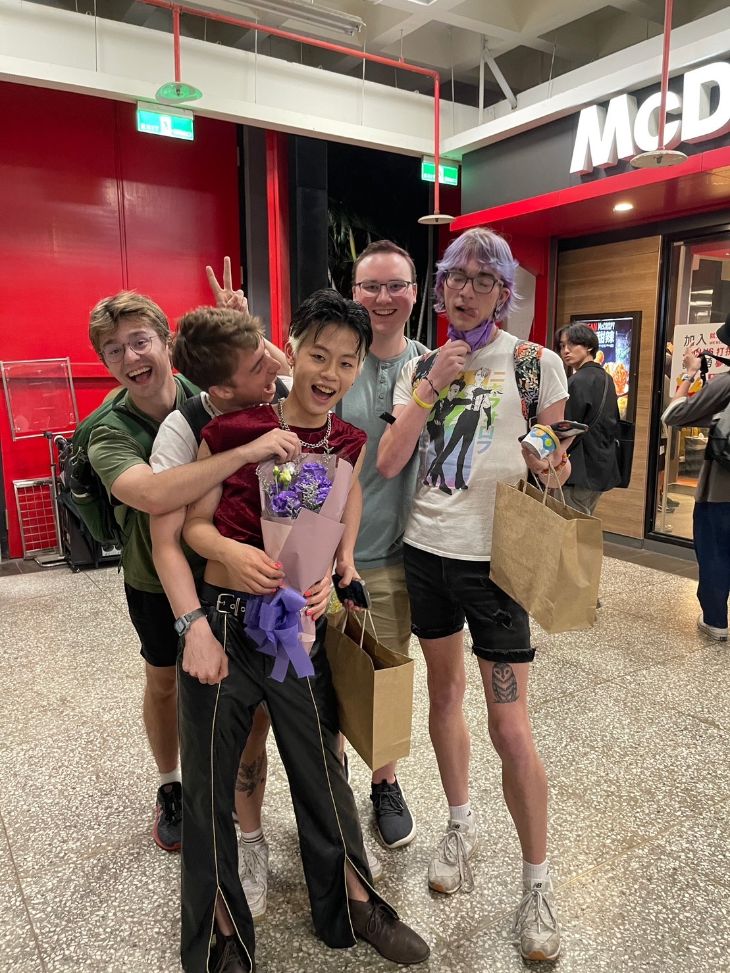James ("Logan") Dosher
About My Study Abroad Program
Major/Minor: Chinese, Global Studies
Program: Weir Fellowship (CET)
Location: Taipei, Taiwan
Email: jamedosh@email.unc.edu
Term: Summer 2019 (NSLI-Y), Weir Fellow (Spring 2023-Summer 2023)
Why did you choose to study abroad and how did you select your program?
Being a NSLI_Y alumn, I knew the power of global education and language skills, so returning to an academic environment abroad was a primary goal upon entering college; however, due to the impact of COVID-19, actualizing this goal proved challenging. I applied for the Weir Fellowship freshman and sophomore year, but the programs were cancelled. This year, the Weir was able to run again in Taipei, Taiwan. Thankfully, my consistency paid off, and I was able to continue Chinese studies immersed. I am eternally grateful for the experience.
What did you learn about yourself?
Through this experience I was reminded of my own adaptability. COVID-19 certainly impacted my comfort in new environments, which is something I had not experienced in a long time. Being home and alone for so long disrupted my social flow and confidence; however, being abroad I noticed how easily I was able to fall into step with those around me-- how the rhythm of my heart and the beat of my step synced with that of Taiwan's. It was an amazing gift to witness myself overcome language barriers, confidence issues, and discomforts for the sake of integrating myself and crafting a home abroad.
What is one of your favorite memories from your program?
There is a film roll of fluttering memories that are forever ingrained in my mind; however one of my favorite memories involved my local roommate in Taiwan. Through Chinglish, we were able to connect deeply about our shared identities as queer men in home environments that condemned them. It was a beautiful and special display of unity despite vastly different cultural upbringings, as well as a milestone in my language learning journey. Chinese is a daunting language to learn, but by the summer of 2023, I found myself being able to express myself in ways I was never able to before. I hope other students are gifted that experience.
What advice do you have for future study abroad students?
You have community. Those around you likely are experiencing similar emotions. In my opinion, studying abroad is one of the strongest exercises in communication-- maintaining communication back home, navigating foreign language, and connecting with people you likely don't know-- communicating your emotional needs or anxieties is no exception. Know that your uncertainties are key to you growing as an individual. If you are able to push yourself out of your comfort zone you will come back a changed person.
How do you identify?
LGBTQ+, First Generation College Student, Covenant Scholars, Scholarship Recipient
Could you share any experiences where your identity played a role in your time abroad?
Being a first-generation, low-income college student, there are certain challenges that I faced that some of my fellow peers could not relate to. When listening to other students discuss their family trips abroad, or their parents' global educations, or witnessed their ability to purchase things out of my budget, I certainly felt imposter syndrome. At times, the feeling that my peers could not relate to me or my background stung; however, if I zoomed out of that specificity, I was able to appreciate the vast diversity of backgrounds present on my trip. Although we all came from different walks of life, whether fellow American student, local Taiwanese, Japanese exchange student, etc., we were able to connect to each other through this shared experience of being in the same place, at the same time, with the same want for community. Additionally, being queer was something that helped me locate and form relationships with local queer Taiwanese. This identity abroad actually helped me connect to the local community and has now inspired me to do a thesis centering Taiwanese queer history.
Is there any advice you would give to other students who share your identity?
Low-income students should meet with financial advisors. I think it is hard to keep up pace with wealthier students-- this was an experience that troubled me. There is no shame in your status and you should feel equipped to budget and avoid financial hardship.
If you faced any challenges abroad, where could you turn to get the support you needed?
Those close to you on the program will serve as a great emotional support system, but if that feels inadequate or inaccessible, program staff is there to support you-- you have resources.
Memories

